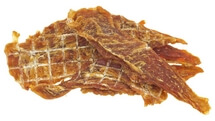October 23, 2013 — The US FDA has issued an update detailing its ongoing investigation of Chinese jerky pet treats. Readers are reminded this is not another recall — only a progress report.
The detailed update includes:

- FDA Progress Report
- Dear Veterinarian letter
- Fact Sheet for pet owners
- Questions and Answers page
- Investigation and findings
A Brief Summary
The FDA has received about 3000 complaints of illness related to consumption of chicken, duck, or sweet potato jerky treats. Most involve products imported from China.
The reports involve over 3600 dogs, 10 cats and include more than 580 deaths.
The FDA continues to investigate the cause of these illnesses and is working with its partners in the Veterinary Laboratory Investigation and Response Network. The Vet-LIRN is a network of animal health laboratories affiliated with the FDA.
The complaints received this far by the FDA include adverse events involving different ages, sizes, and breeds of dogs.
About 60 percent of the reports are for gastrointestinal illness (with or without elevated liver enzymes) and about 30 percent relate to kidney or urinary signs.
The remaining 10 percent of jerky treat cases involve a variety of other signs including:
- Convulsions
- Tremors
- Hives
- Skin irritation
Potentially Serious Kidney Condition
Of the kidney and urinary cases, about 135 of the case reports have been for a condition known as Fanconi syndrome. Fanconi syndrome is considered a type of kidney disease.
Part of the normal function of the kidney is to filter out waste while retaining nutrients such as glucose, bicarbonate, and amino acids.
With Fanconi syndrome, a part of the kidney called the proximal tubule doesn’t work properly, and these nutrients are lost into the urine instead of being reabsorbed.
Dogs with Fanconi Syndrome usually drink and urinate much more than normal. This can also be a sign of diabetes. Yet Fanconi dogs do not have the elevated blood sugar that is a hallmark of diabetes.
They can also be lethargic and uninterested in eating. Some dogs may have all of these symptoms while others show only some of them. The symptoms may also be mild or severe.
These dogs often improve when they are no longer fed the treats. However, a positive urine test for Fanconi syndrome can still be detected several weeks later.
Not Just Chicken
It’s important to note that the reported illnesses are not limited to jerky treats made from chicken.
The FDA has received complaints about duck and sweet potato jerky treats and related products such as jerky-wrapped rawhide.
It’s known that the reported illnesses and deaths are mostly linked to jerky pet treats sourced from China.
However, pet owners should be aware that manufacturers do not need to list the country of origin for each ingredient used in their products.
What to Do?
Keep in mind, treats are only treats. They’re not a necessary part of a fully balanced diet. So, eliminating them will not harm pets. All the nutrients your pet needs can be found in commercially produced pet food.
You can report complaints about FDA-regulated pet food products by calling the consumer complaint coordinator in your area.
Or go to http://www.fda.gov/petfoodcomplaints.
Get Critical Dog Food Recall Alerts
Delivered to You by Email
Get dog food recall alerts delivered right to your Inbox the moment we become aware of them. Subscribe to The Dog Food Advisor’s Dog Food Recall Alert email notification list now. There is no cost for this service.
Recalls & Warnings
See all recalls| Date | Brand/Store, Issue type & Product | Issue type | Product |
|---|---|---|---|
| 07.01.2024 |
Viva
Viva Recalls Turkey And Puppy Recipes Due To Listeria Monocytogenes Contamination
RECALL
|
RECALL | Viva Recalls Turkey And Puppy Recipes Due To Listeria Monocytogenes Contamination |
| 06.20.2024 |
TDBBS
TDBBS voluntarily recalls Green Tripe dog treats due to the potential presence of foreign metal objects
RECALL
|
RECALL | TDBBS voluntarily recalls Green Tripe dog treats due to the potential presence of foreign metal objects |
| 05.17.2024 |
Pedigree
Mars Petcare Recalls Bags of Pedigree Adult Complete Nutrition Due To Potential Loose Metal Contamination
RECALL
|
RECALL | Mars Petcare Recalls Bags of Pedigree Adult Complete Nutrition Due To Potential Loose Metal Contamination |
| 01.27.2024 |
Viva
Viva Recalls Duck Recipes Due to Potential Salmonella, Listeria Monocytogenes Contamination
RECALL
|
RECALL | Viva Recalls Duck Recipes Due to Potential Salmonella, Listeria Monocytogenes Contamination |


